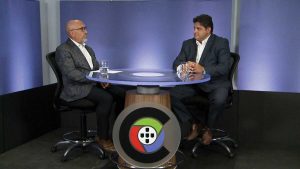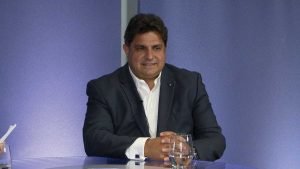Here’s The Thing Nick Migliori

The modern world has evolved fast, creating new forms of crime and new issues we weren’t prepared to deal with. Hence, bringing to our attention how delicate and extremely vital security is. A common concern around the world, but that has increased during the last years in Toronto with the rise of gangs and armed violence in a city where part of the population is asking to defund the police. Then, what is the answer to a safer society?
This week on Here’s The Thing, for Camões TV, Manuel DaCosta interviewed Nick Migliori, President of Executek International, a company that provides security services to commercial, industrial and residential clients across the Great Toronto Area.
After being in the security sector for decades and seeing how the procedures have evolved, Nick Miglioti will explain us how major events as terrorism, anarchist movements and the pandemic have changed his line of work.
Manuel DaCosta: Tell us about you and the services Executek International provide.
Nick Migliori: Executek International is a security services firm. We provide various services from security guards, to private investigators, consulting, we also do system design work, treat risk assessment on facilities, we make recommendations, treat risk mitigation. We work with clients to develop plans and strategies so they can protect their propriety, their visitors and their tenants and so forth.

MDC: How is Executek International doing to cope with the pandemic?
NM: We are looking at our people component, training them adequately on the requirements of today’s needs, the pandemic side of things. They are spending more time developing themselves so they can respond to the diversified issues that exist today. We live in a much more complicated world today then 30 years ago. It’s about investing in people, giving them the right tools, the right education and training, so they can do the best job possible.
MDC: Security is a major topic nowadays. We just celebrated 9/11, it has been 19 years that those Towers came down and a lot changed after that event in terms of security concerns. The United States President at that time promised border security, immigration security, and many other policies. Based on the implementation of those measures and the fact that terrorist organizations still prevail, do you consider the measures implemented had any effect to a more secured world?
NM: I believe they have. Major events, like the 9/11, caused changes not only in security organizations but also in facilities and organizations that own different properties, they had to rethink how these proprieties are being protected. Governments became more in line working with the private sector and public-private initiatives arose to be as proactive as possible, to protect, to disseminate information. They work together, to communicate when something happens, how you can secure when something happens downtown, either in the financial district or touristic destinations like the CN Tower.
I do believe 9/11 was a catalyst in helping to shift the paradigm in the right direction. At the time, I was in the CN Tower, we had implemented screening processes that have remained in place. Those who visit the CN Tower are going through a screening process, either metal detectors, x-rays or sniffer technology to detect explosives. Before that didn’t really exist, it was only used in airports. That is an example of changes that still remain in place all these years. So, yes, I do believe things have changed for the better in making facilities safer, not only in a security but also in a fire safety perspective.
MDC: Besides all the technology implemented, the human factor is still very important. Is essential to control and check everything. How can you replace that?
NM: When you look at the layers of security, similar to an onion for example. These layers are mitigating against risk, you have technology, policy and procedures and you have to rely on the people component, that will never go away. During this pandemic, some facilities will institute thermal cameras, which will be sensing temperatures as people walk through an entrance. If your temperature reaches certain levels, you will be pulled aside and asked some questions. This technology sends an alarm, and somebody has to see it and respond to it. There is a percentage of human error, you try to eliminate that with redundancy, signals and alarms, but in the end the human component will always exist.
MDC: Technology will never analyze situations as the human eye.
NM: That’s true. They try to do that today with all the analytical software. For example, if they look at directional motion – if you are going through an aisle in a certain direction and decide to switch directions, the software will send an alarm to the control center, that control center is supervised by a human, the human will have to look at that and determine why is this person going in the wrong direction. And then, human intervention is required to investigate. All the analytical, from sensing motion, sensing touch, temperature, all that has been placed for a long time, but the human component is the last ingredient that brings any efficiency to respond.
Are they trained properly? Are you hiring the right people? How do you motivate them? Are they getting tired because they are seating there looking at screens and monitors? These are the questions we need to answer.
MDC: From alarm systems to street cameras, we are being watched everywhere. In spite of that, do you think people are taking care of themselves regarding security inside and outside their home?
NM: I think there is a higher awareness than in the past. There is always a percentage of individuals that don’t invest much and feel that they live in a safe city. Today, it’s different, when you look at a developer who builds a property, they are looking to incorporate alarm systems. Big companies as Rogers, Bell and Telus have made acquisitions and diversified their portfolio to include home security, so they can compete. The trend is going in that direction.
MDC: If we look global, but most specifically to North America, we have these events occuring, protests and anarchist movements… the request to defund the police, they don’t want law and order to interfere in their lives. If this terrorism from within continues to develop, if the police forces become fearful of intervention, where are we going as a society regarding the implementation of safe measures for the average citizen?
NM: If we recall, Toronto hosted the G20 and we had an anarchist group intervene, burning Toronto police cars, breaking windows, and that affected Toronto in a very negative way. There are political interest groups that intervene and are designed to disrupt and cause this anarchist movement. Recently, when we had these later protests, not like in the US, we didn’t have any major issues in Toronto, the police managed it very well, they communicated with them. The city allowed them to express their position. Whether you disagreed or not, they were really well managed.
We need to take a step back and consider what is the motivation behind it, who is funding them. There’s also a naive element, you have young people thinking I’m going to join this protest movement, without really understanding what they are all about, they get caught up in the moment and it becomes very disruptive and safety issues occur.
MDC: It seems the younger crowds are more prone to be seduced by these movements, why do you think that happens?
NM: There’s a percentage of youth that are not functioning in a harmonistic way, so they get caught up with these small percentage of agitators, that have a different cause and message they are trying to deliver. Many attend the protest believing in the movement and in the cause, that doesn’t result in a violent position. The young person is a bit naive and doesn’t do they research properly or understood as I’m going because it’s the right thing to do. But then, within that group, you have almost like a clandestine group which entire purpose is to cause chaos, to disrupt, to destroy and not to deliver a message. That is more evident in the US than in here.
MDC: In the US, we saw Kamala Harris, a potential future President of the USA, encouraging this kind of behavior for political purposes. Incentivizing a war in within, while white militias are going to be formed to defend themselves. What is her message and how do we know the same won’t happen in Canada?
NM: Does she really believes that she wants people to burn buildings down, break things or to steal? I think it’s just a political position, trying to achieve a message to gain votes. But she should be held responsible for inciting to violence and chaos, that’s not acceptable. When you take a person, who has worked their entire life, which owns a variety store, and next thing you now have burned it down, they should have protection and that’s what police is there to do. They shouldn’t be allowed to cross a line where there’s a violent action and that is the fine line between anarchy. I think she is sending the wrong message. Violence is not and never was the answer. She’s being irresponsible as a political leader. She needs to take a step back a rethink another way to get votes.
MDC: We both know there has been some injustice towards black people, this has been happening for many years and now the media picked up on it and its being used for political reasons. The idea that the world is controlled by white people is not totally true.
This week, a young black man walks to a police cruiser and shoots the officers because he feels that he should kill somebody because a black person died. Where are we going with this?
NM: I think we have to try to work together in a harmonistic way. When you look at policing and security, I don’t think people understand how many incidents they have to deal with, thousands of incidents, and the percentage of error is very minute. Of course, things happen, and mistakes occur. The human percentage error does exist, but I don’t think people get into those professions to cause harm to others and that is the bottom-line denominator. People being very critical of that profession don’t really understand what these individuals are going through. It’s like what we learned during the pandemic, what nurses were going through in the hospitals during difficult situations, the stress they have to face. People get in these professions because they want to help others.
Also, a lot of this gets manipulated for political agenda purposes. The only way to bridge gaps is trying to work together. You are always going to have a small percentage of criminal element that doesn’t care, they do what they want to do. Leaders cannot negatively jump on those things and criticize when they don’t really understand what’s going on. A police officer, or even a security person, they get an alarm call, go to the person’s house, someone’s breaking in, you are dealing with a very stressful situation. These are things that happen regularly in Toronto. They do a very good job; they are well trained.
MDC: This year, in the City of Toronto alone, we already had 308 shootings and while the murder rates may be going down, the shooting rates are increasing. This is not yet related to defunding the police, this is related to something else. What do you consider to be the causes?
NM: When we hear about defunding… what does that actually mean? Today, policing is very complex, they are dealing with white color crime, cybercrime, which were things that weren’t so prevalent years ago, and the list goes on and on. Defunding is not the appropriate answer, we have to look to what they need, the resources required.
Related to the shootings, everyone is aware that exists an illegal gun issue. These guns came from across the border, they have to create resources to combat that. How do you stop it? The focus should be done federally, working with each province depending on border crossings, to fund with technology and people power to deal with that issue.
Then, you have the issue of gangs and guns in Toronto. Recently the Toronto Police had a big arrest of over one hundred gang members, they confiscated weapons and drugs. People cannot freely walk the streets with these illegal guns and get into shooting wild west scenarios.
In the end, it’s not about being so critical about budgets and funding, it’s about the strategies behind it. The police really need support working with different community organizations to help make those neighborhoods safe.
MDC: The politicians are fairly quiet about this, they haven’t provided any solutions or openly talked about these problems.
NM: You shouldn’t be worried about walking down the street to get some ice cream and being hit by a lost bullet. The politicians need to be true leaders and worry about Toronto being safe.
MDC: We are going through a management change in the police service with a new Chief being chosen. Should it be from Toronto or from outside Toronto?
NM: You need someone who has experience in a large police force setting, in a large municipality, Toronto is the largest in Canada. If you have the right criteria, the right background, the right experience, the person can be from almost anywhere. But that person needs to understand the Canadian culture, the dynamics of the City, the multicultural aspect, the inner workings of a large police force and many other criteria.
When they are looking for a replacement, sometimes there’s not as many people who fulfil all the requirements, limiting the list. We have very good leadership in Toronto, and I believe everyone wants to do the best job possible to keep Toronto safe. Politically, sometimes there’s interferences, they are afraid to do what needs to be done. In the end, you have to look at the leadership, the Mayor, the Counselors, they really influence the flow of Toronto. We have to go back to Toronto the Clean, Toronto the Safe.
Manuel DaCosta/MS
Transcrição: Inês Carpinteiro








Redes Sociais - Comentários